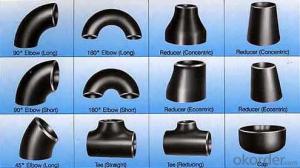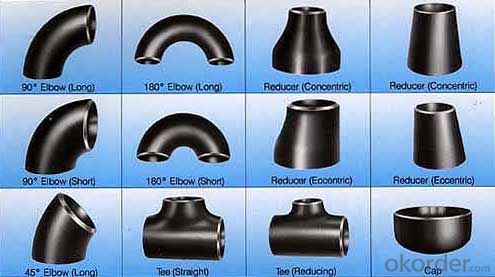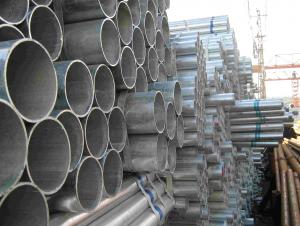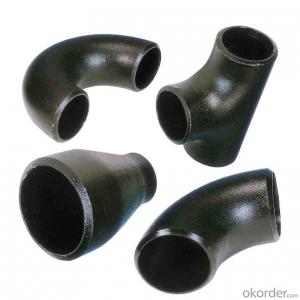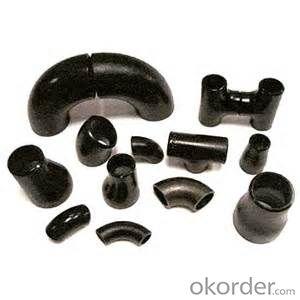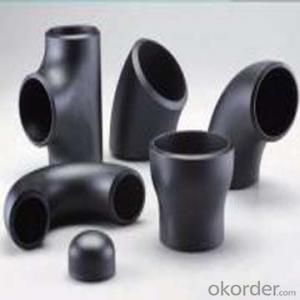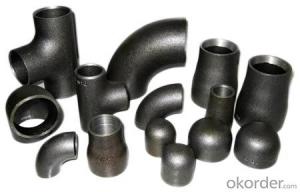CARBON STEEL PIPE FITTINGS ASTM A234 TEE 5''
- Loading Port:
- Tianjin
- Payment Terms:
- TT OR LC
- Min Order Qty:
- 1 m.t.
- Supply Capability:
- 30000 m.t./month
OKorder Service Pledge
OKorder Financial Service
You Might Also Like
Specifications
1.we produce seamless steel pipe
2.size:48-219*4.5-45mm
3.ISO 9000 approved
4.Market:south/east Asia,Mid-east,South America
seamless steel pipe
Material J55 K55 N80 L80 P110.etc
Standard ASTM JIS
Usage conveying oil gas ,oil pipe line,pipe material collar,oil nature gas,
Packing wooden cases or wooden pallet ,export standard package
Others:Special design available according to requirement
Anti-corrosion available and high temperature resistence
Delivery time 30days
Payment term T/T L/C
Name | API oil casing pipe | ||||
Out Diameter | Wall thickness | Material | Thread | Length | |
in | mm | ||||
5 1/2 | 139.7mm | 6.20 | J55/K55/N80 | LTC/STC/BTC | R2 |
6.98 | |||||
7.72 | |||||
9.17 | |||||
10.54 | |||||
6 5/8 | 168.28mm | 7.32 | J55/K55/N80 | LTC/STC/BTC | R2 |
8.94 | |||||
10.59 | |||||
12.06 | |||||
12.06 | |||||
8 5/8 | 219.08 | 8.94 | H40 | S/L/B | 9 5/8R2 |
J55/K55 | S/L/B | ||||
10.6 | L80 | L/B | |||
12.7 | L80 C95 | L/B | |||
14.15 | P110 | L/B | |||
9 5/8 | 244.48 | 13.84 | J55 K55 | R2 | |
15.11 | L80 | L/B | |||
10 3/4 | 273.05 | 11.43 | J55 K55 | S/B/E | R2 |
13.84 | P110 | S/B | |||
15.11 | P110 | S/B | |||
11 3/4 | 298.45 | 12.19 | J55 K55 | S/B | R2 |
10.96 | J55 K55 | S/B | |||
13 3/8 | 339.72 | 12.19 | J55 K55 L80 | S/B | R2 |
10.92 | J55 K55 | S/B | |||
13.06 | L80 | S/B | |||
Coupling and thread can be required according to customer requirment
- Q: Can steel pipes be used for the construction of offshore platforms?
- Yes, steel pipes can be used for the construction of offshore platforms. Steel pipes are commonly used in offshore construction due to their high strength, durability, and resistance to corrosion in harsh marine environments. They are suitable for various applications, including the fabrication of jacket legs, risers, pile sleeves, and other structural components necessary for offshore platform construction.
- Q: What are the different types of steel pipe coatings for underground applications?
- There are several types of steel pipe coatings used for underground applications, including fusion bonded epoxy (FBE) coating, three-layer polyethylene (3LPE) coating, three-layer polypropylene (3LPP) coating, and coal tar enamel (CTE) coating. Each of these coatings provides different levels of protection against corrosion and abrasion, ensuring the longevity and durability of the steel pipes in underground environments.
- Q: Can steel pipes be used for hydronic heating systems?
- Yes, steel pipes can be used for hydronic heating systems. Steel pipes are commonly used in hydronic heating systems due to their durability, strength, and ability to withstand high temperatures and pressures. They are also resistant to corrosion, making them suitable for long-term use in these systems.
- Q: Can steel pipes be used for drinking water supply?
- Drinking water supply can indeed utilize steel pipes. For water distribution systems, steel pipes are widely employed owing to their robustness, longevity, and capacity to endure high pressures. Nevertheless, it is crucial to highlight that the steel employed in these pipes must be purposefully engineered and endorsed for potable water applications. This ensures the water remains uncontaminated by any detrimental substances. Furthermore, regular inspections and appropriate upkeep are imperative to avert the development of rust or corrosion, which may impact water quality.
- Q: How do you protect steel pipes from rusting?
- To protect steel pipes from rusting, several methods can be employed. One common approach is to apply a protective coating to the pipes. This can be done by using paint or other types of protective coatings designed specifically for metal surfaces. The coating acts as a barrier between the steel and the elements, preventing moisture and oxygen from coming into contact with the metal and causing rust. Another method is to galvanize the steel pipes. Galvanizing involves coating the pipes with a layer of zinc, which creates a protective barrier that prevents rust from forming. This process is commonly used for outdoor applications or in environments where the pipes are exposed to moisture. Regular maintenance is also crucial in protecting steel pipes from rusting. This includes inspecting the pipes for any signs of corrosion or damage and promptly addressing any issues that are found. Additionally, keeping the pipes clean and dry can help prevent rust formation. In some cases, installing sacrificial anodes can provide additional protection against rust. Sacrificial anodes are made of a more reactive metal, such as zinc or magnesium, and are attached to the steel pipes. These anodes corrode instead of the steel, sacrificing themselves to protect the pipes from rust. Lastly, proper storage and handling of steel pipes is essential. This means storing them in a dry, well-ventilated area, away from moisture and humidity. It is also important to handle the pipes with care to avoid any scratches or damage to the protective coatings. By employing these methods and practices, steel pipes can be effectively protected from rusting, ensuring their longevity and durability.
- Q: Theoretical weight of 25*25*1.5 square steel tubes
- The theoretical weight of 25*25*1.5 square steel tubes is 1.075kg/m.
- Q: What is a steel pipe?
- A steel pipe is a cylindrical hollow tube made of steel, known for its strength and durability. It is commonly used in various industries for transporting fluids, gases, and solids, as well as for structural purposes in construction and infrastructure projects.
- Q: Can steel pipes be used for paper mills?
- Yes, steel pipes can be used for paper mills. Steel pipes are commonly used in paper mills for various purposes such as transporting fluids, chemicals, and steam within the facility. They are known for their durability, strength, and resistance to corrosion, making them suitable for the harsh conditions and high-pressure requirements of paper mill operations.
- Q: How are steel pipes used in bridge construction?
- Steel pipes are commonly used in bridge construction as piling or foundation elements. They are driven into the ground to provide support and stability to the bridge structure. Additionally, steel pipes can be used as structural members in the bridge's superstructure, such as for the construction of bridge piers or trusses, due to their high strength and durability.
- Q: What are the different types of steel pipe coatings for corrosive environments?
- There are several types of steel pipe coatings that are commonly used for corrosive environments. These include fusion bonded epoxy (FBE) coating, three-layer polyethylene (3LPE) coating, three-layer polypropylene (3LPP) coating, and coal tar enamel (CTE) coating. FBE coating provides excellent corrosion resistance and is commonly used for underground pipelines. 3LPE and 3LPP coatings combine a layer of epoxy, an adhesive layer, and a polyethylene or polypropylene outer layer, offering superior protection against corrosion and mechanical damage. CTE coating, although less common nowadays, is still used for certain applications due to its resistance to water and chemical corrosion.
Send your message to us
CARBON STEEL PIPE FITTINGS ASTM A234 TEE 5''
- Loading Port:
- Tianjin
- Payment Terms:
- TT OR LC
- Min Order Qty:
- 1 m.t.
- Supply Capability:
- 30000 m.t./month
OKorder Service Pledge
OKorder Financial Service
Similar products
Hot products
Hot Searches
Related keywords
